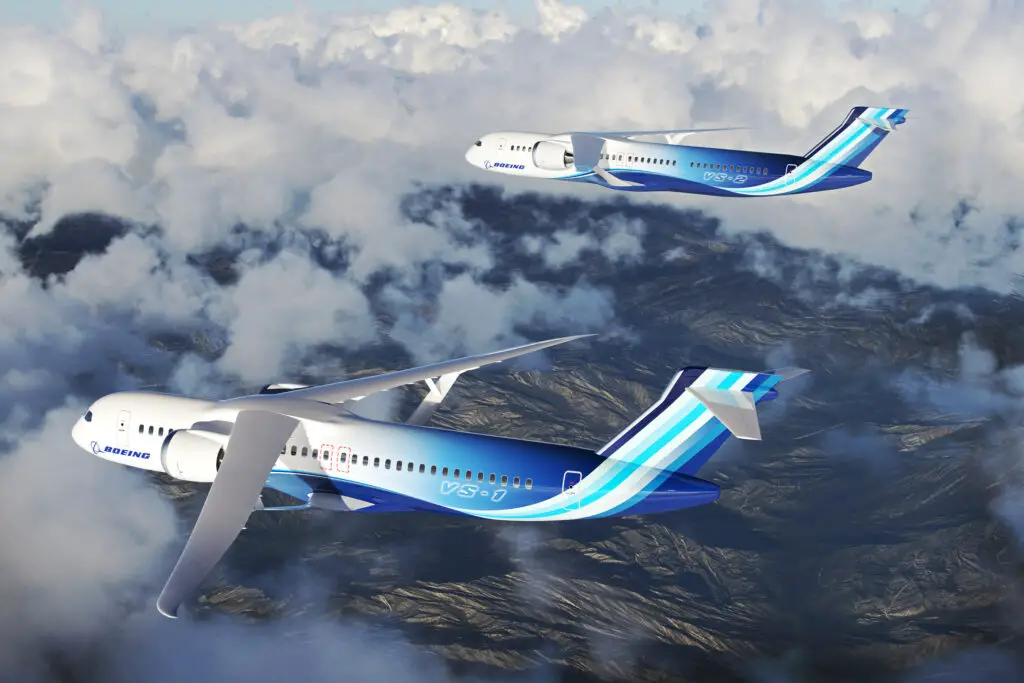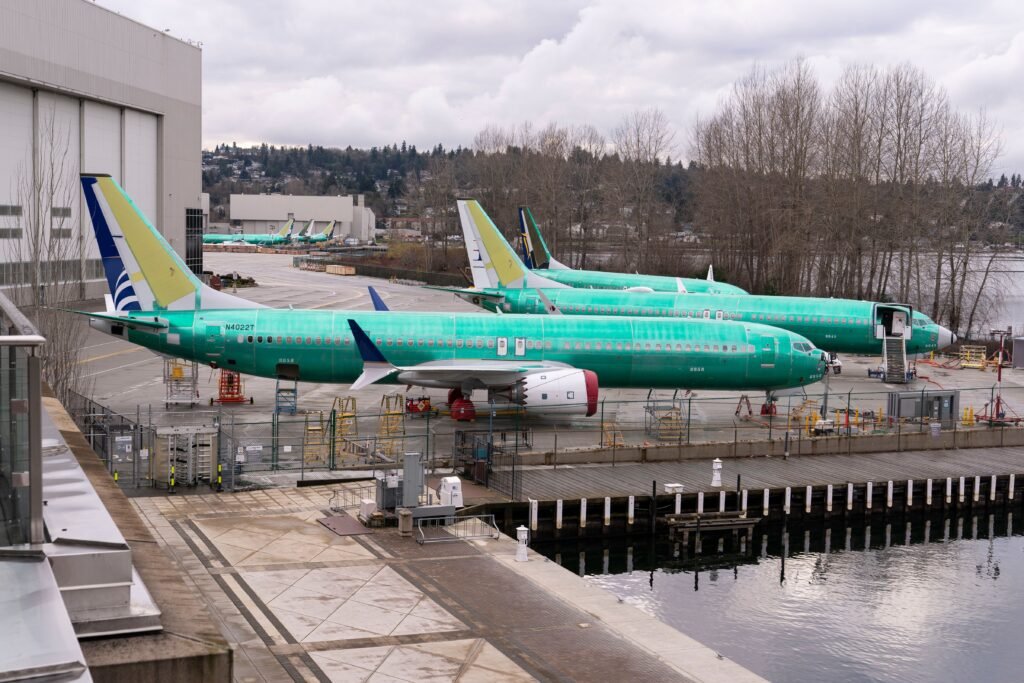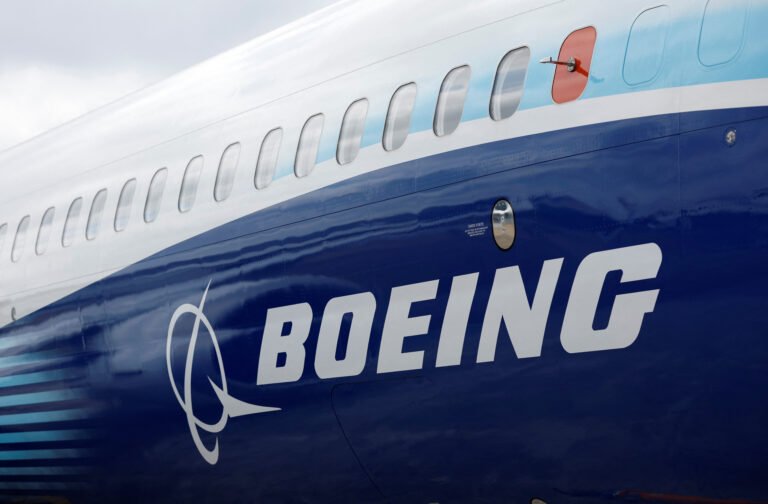Boeing, founded in 1916 by William E. Boeing, is a global leader in the aerospace industry. The company, headquartered in Chicago, Illinois, employs 161,100 people as of January 2020. With an annual revenue of $76.56 billion in FY2019, Boeing offers a diverse range of products and services, including commercial airliners, private jets, satellites, air defense weapons, security systems, helicopters, and global services. However, the company experienced a net income loss of $636 million during the same period.
Boeing faces tough competition from rivals such as Airbus, Lockheed Martin, General Dynamics, and GE Aviation. Despite this, the company has maintained its position as the second-largest aerospace company globally, with a strong market share and a reputation for innovation and quality.

Jump Ahead To :
Key Takeaways:
- Boeing is a global leader in the aerospace industry.
- The company offers a wide range of products and services.
- Boeing faces competition from Airbus, Lockheed Martin, Embraer & Bombardier
- The company reported a net income loss of $636 million in FY2019.
- Boeing’s strengths include a strong market share and innovation.
Boeing’s Strengths
Boeing, as the second-largest aerospace company globally, possesses several key strengths that contribute to its success and prominence in the industry. These strengths include:
Strong Market Share
Boeing holds a significant market share, solidifying its position as a leader in the aerospace sector. This market dominance allows the company to exert influence and pursue strategic initiatives with confidence.

Innovative Capabilities
Known for its cutting-edge innovations, Boeing continually pushes the boundaries of aerospace technology. The company’s commitment to innovation sets industry standards and ensures that it remains at the forefront of advancements.
Wide Variety of Aircraft
Boeing’s extensive range of aircraft enables it to satisfy diverse customer needs, catering to both commercial and private aviation markets. The company offers a multitude of options, from large commercial airliners to private jets, allowing customers to find the perfect match for their requirements.
Strong Relationships with Suppliers and Strategic Partners
Boeing values strategic partnerships and maintains strong relationships with its suppliers. These collaborations enhance the company’s capabilities, fostering innovation and reliability throughout its supply chain.
Robust Supply Chain
With a focus on efficiency and timely delivery, Boeing has established a robust supply chain. The company strategically outsources the manufacture of 70% of its parts, ensuring a steady flow of components and minimizing production delays.
These strengths serve as pillars for Boeing’s success in the aerospace industry, enabling the company to stay competitive, drive innovation, and deliver exceptional value to its customers.
Boeing’s Weaknesses
Boeing, like any other company, faces certain weaknesses that can impact its performance and reputation. Understanding these weaknesses is crucial for the company’s growth and sustainability in the competitive aerospace industry.
Flawed and Unsafe Designs
One of Boeing’s significant weaknesses is its challenges with flawed and unsafe designs, as exemplified by the Boeing 737 Max crashes. These incidents raised serious concerns about the company’s engineering and quality control processes, tarnishing its reputation and resulting in significant financial losses. It is imperative for Boeing to address these design weaknesses and prioritize safety to regain the trust of the flying public and regain its industry-leading position.
Overdependence on Outsourcing
Boeing relies heavily on outsourcing for the manufacturing of its aircraft components. While outsourcing can offer cost-saving benefits, it also introduces potential issues and disruptions in the supply chain. Overreliance on external suppliers puts Boeing at risk of quality control problems, delays in production, and vulnerabilities to changes in supplier availability. The company needs to carefully manage its outsourcing relationships and ensure rigorous oversight to mitigate these weaknesses and enhance its operational efficiency.
Dependence on US Government Contracts
Another weakness for Boeing is its overdependence on contracts with the US government. While government contracts can provide stability and consistent revenue streams, they also expose the company to political and economic factors that are beyond its control. Changes in defense budgets, shifts in government priorities, and geopolitical tensions can all impact the company’s financial performance. Boeing should diversify its customer base and expand its commercial offerings to reduce its reliance on government contracts and mitigate these vulnerabilities.
Poor Labor Management Practices
Boeing has faced criticism for its poor labor management practices, such as the controversial decision to terminate employees who formed a union. These actions have strained the company’s relationship with its workforce and sparked negative publicity. Maintaining a positive work environment and fostering healthy labor relations are crucial for employee morale, productivity, and the overall reputation of the company. Boeing needs to prioritize fair labor practices, engage in constructive dialogue with its employees, and promote a culture of mutual respect and collaboration.
By addressing these weaknesses head-on, Boeing can strengthen its position in the industry, rebuild trust among stakeholders, and position itself for long-term success.

Boeing’s Opportunities
Boeing, a prominent player in the aerospace industry, has several exciting opportunities to explore and capitalize on. These opportunities can further strengthen the company’s position in the market and drive sustainable growth.
One significant opportunity for Boeing is to focus on the US Space Force, a newly established branch of the United States Armed Forces. By becoming the primary contractor for the government, Boeing can secure lucrative contracts and establish itself as a leading player in the space industry.
Building on its reputation for innovation, Boeing can leverage its technological advancements and engineering expertise to capture more market share. This advantage allows the company to attract customers from competitors who value cutting-edge solutions and embrace Boeing’s commitment to pushing the boundaries of aerospace technology.
The demand for satellites is on the rise, driven by advancements in communication networks, increased data transmission requirements, and the need for enhanced global connectivity. This growing demand presents a significant opportunity for Boeing to expand its satellite business and offer tailored solutions to its customers.
The aerospace and defense market is experiencing steady growth, fueled by geopolitical tensions, increasing military expenditures, and the need for advanced security systems. Boeing, with its diverse portfolio of products and services, is well-positioned to capitalize on this growth and secure new contracts.
Furthermore, Boeing has the chance to explore the development of electric planes, flying cars, and more environmentally-friendly aircraft. With a renewed focus on sustainability and reducing carbon emissions, the aviation industry is seeking innovative solutions that align with environmental goals. By investing in these areas, Boeing can contribute to a greener and more sustainable future for air travel.
| Opportunities | Description |
|---|---|
| US Space Force | Focus on becoming the primary contractor for the government and secure lucrative contracts in the space industry. |
| Innovation | Leverage Boeing’s technological advancements and engineering expertise to capture more market share. |
| Satellites | Expand the satellite business to meet the increasing demand and offer tailored solutions to customers. |
| Aerospace and Defense | Capitalize on the growth of the aerospace and defense market by securing new contracts. |
| Environmental-Friendly Aircraft | Explore the development of electric planes, flying cars, and sustainable aviation solutions. |
Boeing’s Threats
Despite its position as a global leader in the aerospace industry, Boeing faces several threats that could impact its success. These threats include intense competition, negative public perception, the ongoing COVID-19 pandemic, economic recession, potential terrorist attacks, trade war, and cybersecurity risks.
Competition from Rivals
Boeing’s main competitor, Airbus, poses a significant threat to the company’s market share. Both companies constantly strive to outdo each other in terms of innovation, technology, and product offerings. This fierce rivalry pushes Boeing to continuously improve to maintain its competitive edge. The battle for dominance in the aerospace industry remains intense and ongoing.
Public Perception of Safety
Incidents such as the Boeing 737 Max crashes in 2018 and 2019 have had a negative impact on Boeing’s safety reputation. These accidents resulted in the grounding of the 737 Max fleet and raised concerns about the company’s commitment to safety. Rebuilding trust and reassuring the public about the safety of Boeing aircraft is crucial for its long-term success.
The Impact of COVID-19
The aviation industry as a whole has been severely affected by the COVID-19 pandemic. Reduced travel demand, flight cancellations, and travel restrictions have led to a significant decrease in aircraft orders and deliveries. Boeing, like other aerospace companies, has faced financial difficulties due to the sharp decline in revenue. The recovery process may be slow and challenging, requiring strategic adaptation to a post-pandemic world.
Economic Recession and Terrorist Threats
An economic recession can impact the demand for new aircraft as airlines prioritize cost-cutting measures. Additionally, the threat of terrorist attacks can lead to a decline in air travel and further financial losses for Boeing. These external factors are largely out of the company’s control but must be considered in its risk management strategy.
Trade War and Cybersecurity Risks
The ongoing trade war between the United States and its trade partners, particularly China, creates uncertainties for Boeing’s business operations. Tariffs, export restrictions, and geopolitical tensions can disrupt supply chains and affect market access. Moreover, cybersecurity risks pose a significant threat to Boeing’s sensitive data and intellectual property. Ensuring data protection and implementing robust cybersecurity measures are imperative to safeguard the company’s operations.
Despite these threats, Boeing has a strong foundation and has demonstrated resilience in the face of challenges throughout its history. By addressing these threats head-on, implementing effective risk mitigation strategies, and consistently delivering high-quality products and services, Boeing can navigate these obstacles and maintain its position as a global leader in the aerospace industry.

Conclusion
Boeing’s strengths position the company as a global leader in the aerospace industry. With a strong market share, innovative capabilities, and a wide variety of offerings, Boeing excels in meeting customer needs. The company’s strong relationships with suppliers and partners further contribute to its success.
However, Boeing does face certain weaknesses that need to be addressed. Flawed designs, overdependence on outsourcing, and poor labor management practices have presented challenges to the company. It is essential for Boeing to address these weaknesses and implement necessary improvements.
Looking ahead, Boeing has several opportunities for growth. The space industry, innovation, satellite technologies, and environmentally-friendly planes are areas where Boeing can capitalize on. By leveraging its strengths, implementing innovative strategies, and staying at the forefront of technological advancements, Boeing can tap into these opportunities and expand its market presence.
Despite its strengths and opportunities, Boeing does face threats that need to be managed effectively. Intense competition, public perception, the ongoing pandemic, economic uncertainties, and security risks pose challenges to the company. Boeing must proactively address these threats through strategic planning, risk mitigation measures, and ongoing improvement.
By conducting a thorough SWOT analysis, Boeing can identify its strengths, weaknesses, opportunities, and threats. By capitalizing on its strengths, addressing weaknesses, pursuing opportunities, and mitigating threats, Boeing can position itself for continued success in the aerospace industry.






